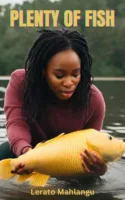The farmer’s market is packed to full capacity when the four friends set up the following weekend. There are all kinds of vendors: fruit vendors, candy makers, antique sellers, and fish vendors, just like them. They set up their table at the corner of the open park, decorate it with white lace and white balloons, and place the fish on cubes of ice inside large woven grass baskets. Though shoppers gaze at their fish and take photographs, calling on other shoppers to come to see ‘the magical fish’, none seem to be interested in buying them.
“These are such beautiful fish,” an elderly woman says.
“And it’s only R250 for one,” Vuyo says, enthusiastically, hoping the woman will reach into her purse.
“Oh, my, I’m not buying, son,” the woman says, as she smiles and walks away.
More shoppers pass by the stall. They take photographs, call on other shoppers, enquire about the price, and then gradually walk away.
Nkateko slams the table aggressively with her hands and chooses to insult the shoppers. “Why did you come to the market if you’re broke, eh?” she yells. “This is a stall, not an exhibition!” she continues, and sits at the corner of the table with her arms folded across her chest like a bodyguard at a night club, waiting for just one more person to try her by taking a photograph of the fish.
“I dare them to try me,” she mumbles to herself. “We worked too hard setting up this stall.”
“These fish…” Another elderly person approaches. This time it is a man with a walking stick and a fisherman’s hat on his head of white hair. His beard is as white and as magical as pearls and he has one good working eye and a brown marble for the other.
“Buy the fish or move along, Ntate,” Nkateko says, but the old man stands firm.
“These are sacred fish. Where did you get them?” he asks, curiously.
“At the lake,” Vuyo replies, shoving Nkateko out of the way.
“Ahh!” the old man lights up and picks up a fish, carrying it in his hands like an infant. When he smiles, he reveals crooked yellow teeth. “These fish are worth more than all the diamonds and gold in Africa,” he says.
“You don’t say,” Evan wonders, his eyes lighting up too.
“Men and women have crossed all the oceans in search of these fish, but to no avail,” the old man says. “I will give you bags of money in exchange for them all,” he continues.
“OK. But what’s in it for you?” Yoli asks, skeptically.
“Don’t mind her, Ntate, she’s like wet tissue,” Nkateko interrupts.
“These are sacred fish, my dear, what I do with them is between me and the gods of magic,” the old man replies, staring at Yoli. “Just a second,” he says, and disappears to the parking lot.
When he returns, he holds a red checkered polypropylene bag in his hand. He places it on the table and opens it like an oyster for the four friends to peek inside. Their eyes light up at the stacks upon stacks of money buried deep in the bag.
“Sweet mother of…!” Vuyo yells, but quickly contains himself.
“It is all yours, in exchange for these here,” says the old man, pointing at the fish. He looks at Nkateko, Vuyo, and Evan, but he studies Yoli a little too hard.
She studies him too. “OK,” Yoli says, and passes him the baskets.
“Find me more fish. And receive more money.” The old man smirks and touches Yoli’s hand gently before releasing the bag of money. “Shout for Gwevu and I will appear,” he concludes, and limps away.
He leaves the friends more eager than they were when they came to the market, and he smiles a rather sardonic smile, for he knows that they’ll be back. They always come back.
Tell us: What do you think Gwevu does with the fish?


